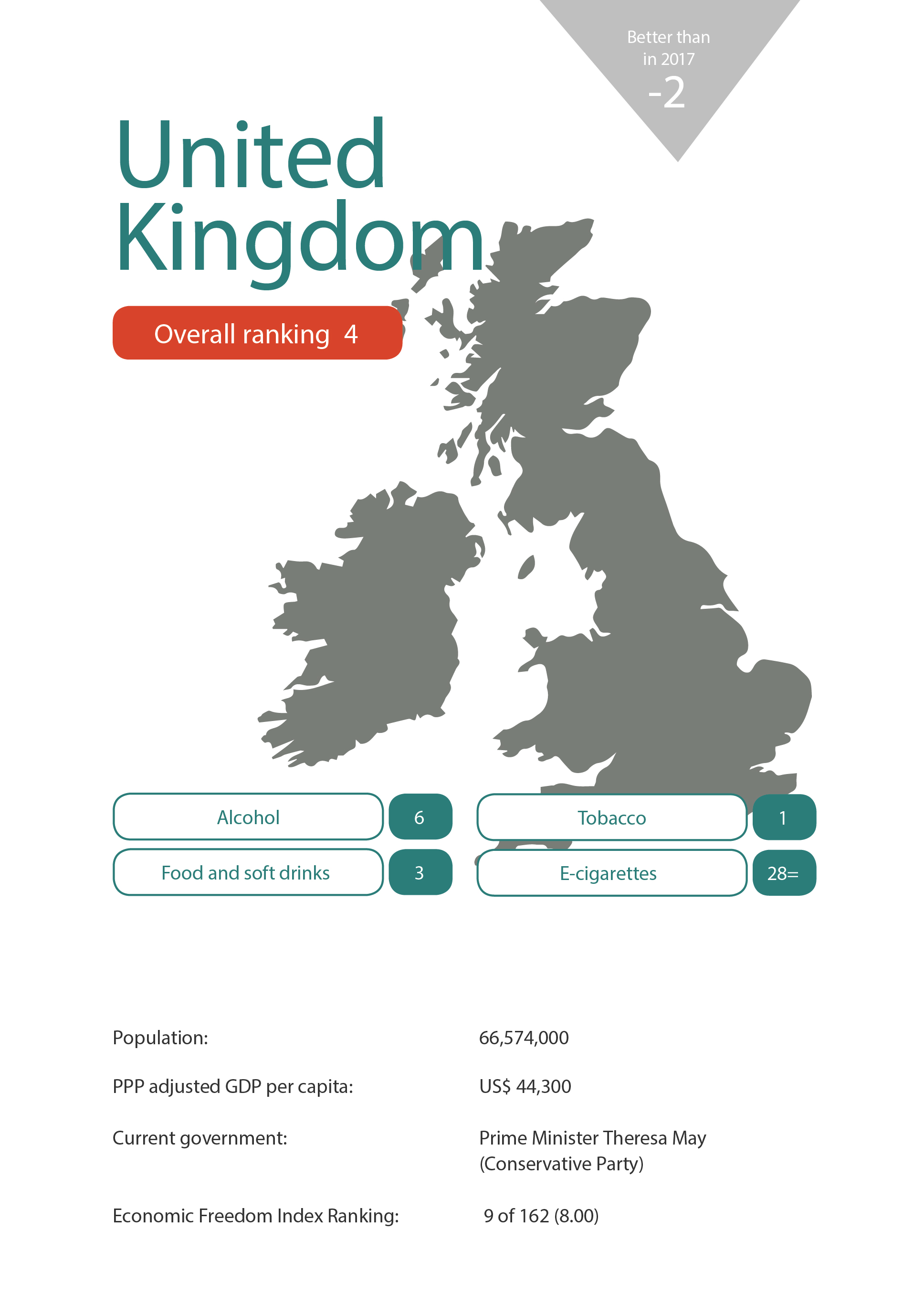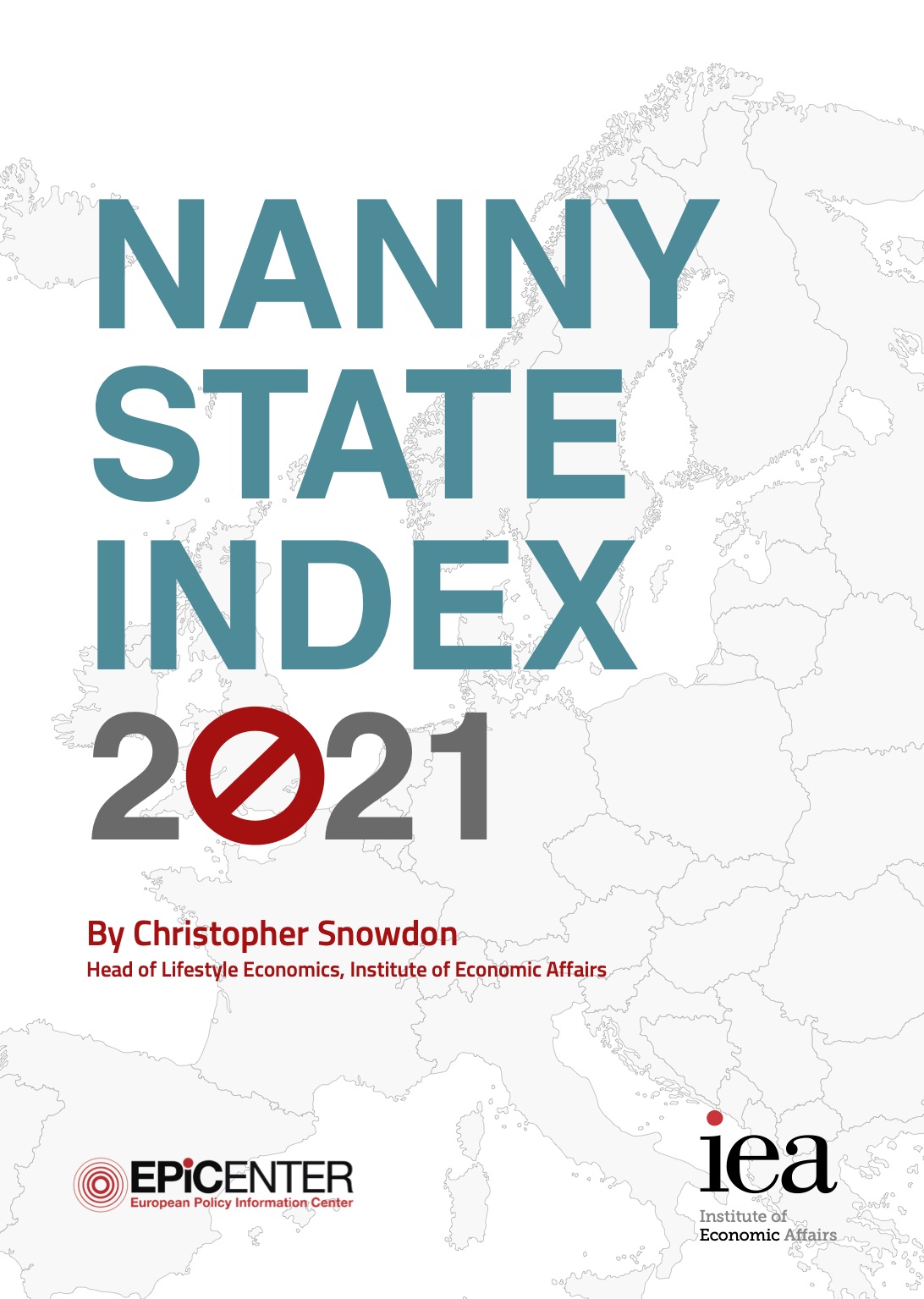
The United Kingdom has slipped out of the top three for the first time, but this is because of a surge of nanny state legislation in Lithuania and Estonia rather than any liberalisation in Britain. Like Ireland, the UK takes a common sense approach to e-cigarettes but is highly paternalistic on food, soft drinks, tobacco and alcohol.
Its smoking ban, introduced in 2007 (2006 in Scotland), allows fewer exemptions than that of almost any other country and was extended to cars carrying passengers under the age of 18 in 2015 (2016 in Scotland). In 2008, Britain became the first EU country to mandate graphic warnings on cigarettes. In 2011, cigarette vending machines were banned. A full retail display ban followed in 2015. In May 2016, the UK and France became the first European countries to ban branding on tobacco products (‘plain packaging’) in May 2016.
The UK has some particularly punitive sin taxes. Adjusted for affordability, it has the highest rate of tobacco duty, the second highest rates of tax on wine and beer, and the fifth highest rate of tax on spirits. Scotland introduced minimum pricing for alcohol at 50p per unit in May 2018, with Wales expected to follow suit in summer 2019. Off trade alcohol discount deals such as buy-one-get-one-free are also banned in Scotland.
Recent years have seen food and soft drinks caught up in the nannies’ web. Food deemed to be high in fat, sugar or salt (HFSS) cannot be advertised during programmes that are mostly watched by the under-16s. This ban was extended to digital media in December 2016 and will be extended to all programmes shown before 9pm if the Conservative government’s obesity strategy is implemented in full. Ostensibly aimed at children, the strategy includes a ban on HFSS food discounts, a ban on displaying HFSS food at the entrance and checkout of shops, mandatory calorie counts on all products in the out-of-home sector, and a ban on the sale of energy drinks (except coffee) to people aged under 18. The Scottish government has published a near-identical plan.
A UK-wide tax on sugary drinks came into effect in May 2018 at a rate of 24p for drinks with more than 8 grams of sugar per 100ml and 18p for those with between 5 and 8 grams per 100ml.
Britain’s score in the Nanny State Index does not reflect the full extent of the government’s meddling in the food supply. Under a putatively voluntary agreement with the food industry, Public Health England has been leading a reformulation scheme aimed at reducing the amount of sugar in food by 20 per cent by 2020 and reduce the number of calories in food by 20 per cent by 2024. The full impact of this endeavour has not yet been realised but consumers have started to notice various popular products becoming smaller and/or less tasty. Since the scheme is technically voluntary, it does not get any points in the index.
The only slivers of liberalism in Britain involve alcohol advertising – which is not banned in any media although there are strict guidelines on content – and e-cigarettes which UK health authorities recognise as beneficial for smoking cessation. A proposal by the Welsh government to ban vaping in ‘public’ places fell apart in 2017, but the idea – and several other nanny state schemes – may rear its head again now that its chief proponent, Mark Drakeford, is the First Minister for Wales. No such law has been seriously proposed in England, Scotland or Northern Ireland.
There has been no gold-plating of the EU’s Tobacco Products Directive with regards to e-cigarettes. Cross-border sales are legal and although the Scottish government has granted itself powers to ban domestic e-cigarette advertising it has not yet done so.
About
The Nanny State Index (NSI) is a league table of the worst places in Europe to eat, drink, smoke and vape. The initiative was launched in March 2016 and was a media hit right across Europe. It is masterminded and led by IEA’s Christopher Snowdon with partners from all over Europe.
Enquiries: info@epicenternetwork.eu
Download Publication

Previous version: 2019
Categories
About the Editor
Christopher Snowdon is the head of Lifestyle Economics at the Institute of Economic Affairs. His research focuses on lifestyle freedoms, prohibition and policy-based evidence. He is a regular contributor to the Spectator, Telegraph and Spiked and often appears on TV and radio discussing social and economic issues.
Snowdon’s work encompasses a diverse range of topics including ‘sin taxes’, state funding of charities, happiness economics, ‘public health’ regulation, gambling and the black market. Recent publications include ‘Drinking, Fast and Slow’, ‘The Proof of the Pudding: Denmark’s Fat Tax Fiasco’, ‘A Safer Bet’, and ‘You Had One Job’. He is also the author of ‘Killjoys’ (2017), ‘Selfishness, Greed and Capitalism’ (2015), ‘The Art of Suppression’ (2011), ‘The Spirit Level Delusion’ (2010), ‘Velvet Glove, Iron Fist’ (2009).
United Kingdom 2019

The United Kingdom has slipped out of the top three for the first time, but this is because of a surge of nanny state legislation in Lithuania and Estonia rather than any liberalisation in Britain. Like Ireland, the UK takes a common sense approach to e-cigarettes but is highly paternalistic on food, soft drinks, tobacco and alcohol.
Its smoking ban, introduced in 2007 (2006 in Scotland), allows fewer exemptions than that of almost any other country and was extended to cars carrying passengers under the age of 18 in 2015 (2016 in Scotland). In 2008, Britain became the first EU country to mandate graphic warnings on cigarettes. In 2011, cigarette vending machines were banned. A full retail display ban followed in 2015. In May 2016, the UK and France became the first European countries to ban branding on tobacco products (‘plain packaging’) in May 2016.
The UK has some particularly punitive sin taxes. Adjusted for affordability, it has the highest rate of tobacco duty, the second highest rates of tax on wine and beer, and the fifth highest rate of tax on spirits. Scotland introduced minimum pricing for alcohol at 50p per unit in May 2018, with Wales expected to follow suit in summer 2019. Off trade alcohol discount deals such as buy-one-get-one-free are also banned in Scotland.
Recent years have seen food and soft drinks caught up in the nannies’ web. Food deemed to be high in fat, sugar or salt (HFSS) cannot be advertised during programmes that are mostly watched by the under-16s. This ban was extended to digital media in December 2016 and will be extended to all programmes shown before 9pm if the Conservative government’s obesity strategy is implemented in full. Ostensibly aimed at children, the strategy includes a ban on HFSS food discounts, a ban on displaying HFSS food at the entrance and checkout of shops, mandatory calorie counts on all products in the out-of-home sector, and a ban on the sale of energy drinks (except coffee) to people aged under 18. The Scottish government has published a near-identical plan.
A UK-wide tax on sugary drinks came into effect in May 2018 at a rate of 24p for drinks with more than 8 grams of sugar per 100ml and 18p for those with between 5 and 8 grams per 100ml.
Britain’s score in the Nanny State Index does not reflect the full extent of the government’s meddling in the food supply. Under a putatively voluntary agreement with the food industry, Public Health England has been leading a reformulation scheme aimed at reducing the amount of sugar in food by 20 per cent by 2020 and reduce the number of calories in food by 20 per cent by 2024. The full impact of this endeavour has not yet been realised but consumers have started to notice various popular products becoming smaller and/or less tasty. Since the scheme is technically voluntary, it does not get any points in the index.
The only slivers of liberalism in Britain involve alcohol advertising – which is not banned in any media although there are strict guidelines on content – and e-cigarettes which UK health authorities recognise as beneficial for smoking cessation. A proposal by the Welsh government to ban vaping in ‘public’ places fell apart in 2017, but the idea – and several other nanny state schemes – may rear its head again now that its chief proponent, Mark Drakeford, is the First Minister for Wales. No such law has been seriously proposed in England, Scotland or Northern Ireland.
There has been no gold-plating of the EU’s Tobacco Products Directive with regards to e-cigarettes. Cross-border sales are legal and although the Scottish government has granted itself powers to ban domestic e-cigarette advertising it has not yet done so.

 Austria
Austria Belgium
Belgium Bulgaria
Bulgaria Croatia
Croatia Cyprus
Cyprus Czech Republic
Czech Republic Denmark
Denmark Estonia
Estonia Finland
Finland France
France Germany
Germany Greece
Greece Hungary
Hungary Ireland
Ireland Italy
Italy Latvia
Latvia Lithuania
Lithuania Luxembourg
Luxembourg Malta
Malta Netherlands
Netherlands Norway
Norway Poland
Poland Portugal
Portugal Romania
Romania Slovakia
Slovakia Slovenia
Slovenia Spain
Spain Sweden
Sweden Turkey
Turkey United Kingdom
United Kingdom


















